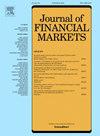股票停牌能否在市场危机中安抚投资者?
IF 2.1
2区 经济学
Q2 BUSINESS, FINANCE
引用次数: 0
摘要
我们研究了投资者在 2015 年 7 月中国股市危机期间面对大量公司发起的股票停牌事件时的交易行为。通过使用上海证券交易所账户层面的交易数据,我们发现,持股价值停牌比例较高的投资者卖出(或买入)非停牌股票的比例较低。因此,股东平均账户水平停牌比例较高的非停牌股票会出现短期相对价格上涨。这一证据表明,停牌可以让投资者冷静下来,从而有助于在危机期间稳定动荡的市场。本文章由计算机程序翻译,如有差异,请以英文原文为准。
Can stock trading suspension calm down investors during market crises?
We examine the trading behavior of investors facing a large number of firm-initiated stock trading suspension events during the Chinese stock market crisis in July 2015. Using account-level trading data from the Shanghai Stock Exchange, we find that investors with a higher fraction of holding value in suspension sell less (or purchase more) of non-suspended stocks. Consequently, non-suspended stocks whose shareholders have a high average account-level suspension fraction experience a short-term relative price appreciation. This evidence indicates that trading suspension can calm down investors and therefore help to stabilize the volatile market during crises.
求助全文
通过发布文献求助,成功后即可免费获取论文全文。
去求助
来源期刊

Journal of Financial Markets
BUSINESS, FINANCE-
CiteScore
3.40
自引率
3.60%
发文量
64
期刊介绍:
The Journal of Financial Markets publishes high quality original research on applied and theoretical issues related to securities trading and pricing. Area of coverage includes the analysis and design of trading mechanisms, optimal order placement strategies, the role of information in securities markets, financial intermediation as it relates to securities investments - for example, the structure of brokerage and mutual fund industries, and analyses of short and long run horizon price behaviour. The journal strives to maintain a balance between theoretical and empirical work, and aims to provide prompt and constructive reviews to paper submitters.
 求助内容:
求助内容: 应助结果提醒方式:
应助结果提醒方式:


